COLEACP’s New Board
- 13/07/2022
- Posted by: Gaetan Dermien
- Category: ACP EN, News
No Comments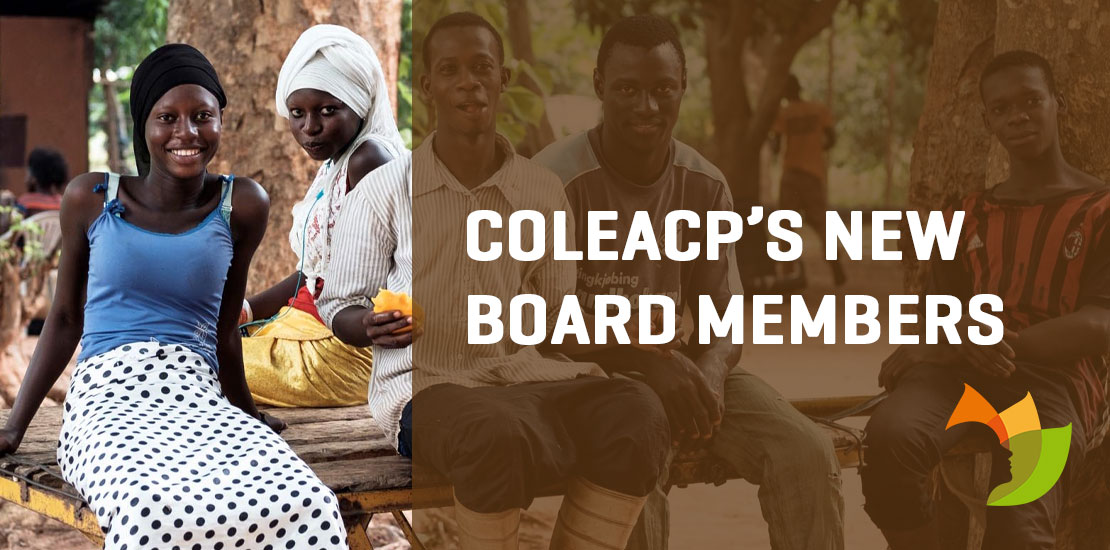 As the term of office of COLEACP’s Board Members expired in June 2022, elections were held at the COLEACP Ordinary General Meeting on 22 June. Sixteen Board Members were elected: ACP EUROPE Chairman Mr Stephen MINTAH, SPEG (Ghana) Vice-President Mrs Leena MALDE, WEALMOOR (UK) Secretary General Mr Jean-Marie SOP, UNAPAC (Cameroon) Treasurer Mr Vincent OMER-DECUGIS, S.I.I.M (France) Mr Moctar FOFANA, AOM (Mali) Mr Thomas HILDENBRAND, SIPEF (Belgium) Mr Karim DOSTMOHAMED, FRIGOKEN (Kenya) Mr Olivier HERRERA MARIN, FRESAL (France) Mrs Virginie… +
As the term of office of COLEACP’s Board Members expired in June 2022, elections were held at the COLEACP Ordinary General Meeting on 22 June. Sixteen Board Members were elected: ACP EUROPE Chairman Mr Stephen MINTAH, SPEG (Ghana) Vice-President Mrs Leena MALDE, WEALMOOR (UK) Secretary General Mr Jean-Marie SOP, UNAPAC (Cameroon) Treasurer Mr Vincent OMER-DECUGIS, S.I.I.M (France) Mr Moctar FOFANA, AOM (Mali) Mr Thomas HILDENBRAND, SIPEF (Belgium) Mr Karim DOSTMOHAMED, FRIGOKEN (Kenya) Mr Olivier HERRERA MARIN, FRESAL (France) Mrs Virginie… +EC “Mirror Clauses” report reiterates importance of WTO rules and support for developing countries
- 13/07/2022
- Posted by: Sandra Borma
- Category: ACP EN, News
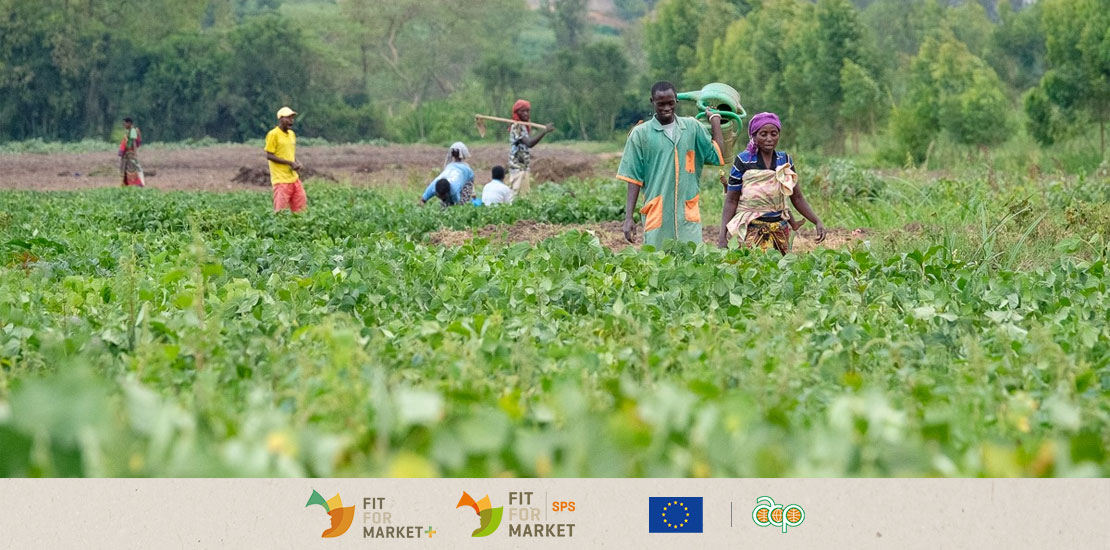 On 3 June 2022 the European Commission published its report on the application of EU health and environmental standards to imported agricultural products. The debate on how EU rules can ensure that imported produce matches EU standards – described as “mirror clauses” – has been a hot topic during France’s presidency of the Council. Several Member States are pressing the Commission to ensure that as the EU strives for higher standards, third countries must be obliged to apply the same… +
On 3 June 2022 the European Commission published its report on the application of EU health and environmental standards to imported agricultural products. The debate on how EU rules can ensure that imported produce matches EU standards – described as “mirror clauses” – has been a hot topic during France’s presidency of the Council. Several Member States are pressing the Commission to ensure that as the EU strives for higher standards, third countries must be obliged to apply the same… +STDF Togo: Meeting of the steering committee (June 2022)
- 30/06/2022
- Posted by: Sandra Borma
- Category: News
 A meeting of the Steering Committee of the “Project to strengthen the phytosanitary control and certification system for the fruit and vegetable sector in Togo (STDF/PG/375)” was held from 29 to 30 June 2022 in Lomé, Togo. The STDF project consists of strengthening the framework and capacities of the services involved in inspection and control, as well as private operators active in the production and export of fruit and vegetables. It should allow better access to markets for fruit and… +
A meeting of the Steering Committee of the “Project to strengthen the phytosanitary control and certification system for the fruit and vegetable sector in Togo (STDF/PG/375)” was held from 29 to 30 June 2022 in Lomé, Togo. The STDF project consists of strengthening the framework and capacities of the services involved in inspection and control, as well as private operators active in the production and export of fruit and vegetables. It should allow better access to markets for fruit and… +Pacific: Training-of-trainers in “Training and communication techniques”
- 04/06/2022
- Posted by: Sandra Borma
- Category: News, Pacific
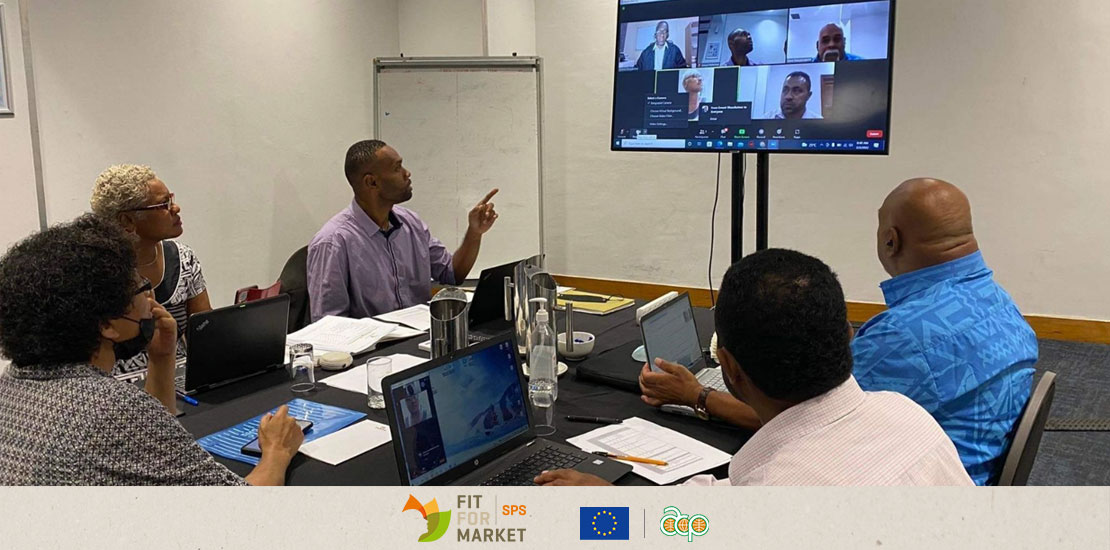 From February to May 2022, 10 experts from Fiji and Papua New Guinea took part in training-of-trainers on communication methods, supported through the EU-funded Fit For Market SPS programme. The training in Fiji was face-to-face; in Papua New Guinea it had to be conducted remotely due to government restrictions. In May, the experts in both countries followed the second phase of this training – to master digital tools, and to be able to facilitate remote training sessions. Conducting remote training… +
From February to May 2022, 10 experts from Fiji and Papua New Guinea took part in training-of-trainers on communication methods, supported through the EU-funded Fit For Market SPS programme. The training in Fiji was face-to-face; in Papua New Guinea it had to be conducted remotely due to government restrictions. In May, the experts in both countries followed the second phase of this training – to master digital tools, and to be able to facilitate remote training sessions. Conducting remote training… +Suriname: Eggplant R-SAT validation workshop
- 01/06/2022
- Posted by: Sandra Borma
- Category: Caribbean, News
 A one-day Eggplant R-SAT Validation Workshop was held on 24 May 2022, in Paramarbio, bringing together 20 key representatives from the public and private horticulture sector to present results of the application of the R-SAT tool to the SPS control system and to identify priority activities. The workshop was delivered by COLEACP and CAHFSA in collaboration with the Ministry of Agriculture, Animal Husbandry and Fisheries of the Republic of Suriname. Prior to this workshop, the COLEACP expert team-initiated dialogue and… +
A one-day Eggplant R-SAT Validation Workshop was held on 24 May 2022, in Paramarbio, bringing together 20 key representatives from the public and private horticulture sector to present results of the application of the R-SAT tool to the SPS control system and to identify priority activities. The workshop was delivered by COLEACP and CAHFSA in collaboration with the Ministry of Agriculture, Animal Husbandry and Fisheries of the Republic of Suriname. Prior to this workshop, the COLEACP expert team-initiated dialogue and… +Togo: Standards training of ANABIO members on organic agriculture
- 27/05/2022
- Posted by: Sandra Borma
- Category: News, Togo
 A training workshop on the Togolese organic agriculture standard and the local organic certification process for member companies of the National Association for Organic Agriculture in Togo (ANABIO) was held from 3 to 5 May 2022 in Lomé. Thirty-four (34) participants from about twenty horticultural companies took part in this training whose main objectives were to (i) train on the concept of the Participatory Guarantee System (PGS) and the Togolese regulatory requirements for the production, processing, and distribution of organic… +
A training workshop on the Togolese organic agriculture standard and the local organic certification process for member companies of the National Association for Organic Agriculture in Togo (ANABIO) was held from 3 to 5 May 2022 in Lomé. Thirty-four (34) participants from about twenty horticultural companies took part in this training whose main objectives were to (i) train on the concept of the Participatory Guarantee System (PGS) and the Togolese regulatory requirements for the production, processing, and distribution of organic… +Penja pepper: Training on SPS good practices for internal auditors and competent authorities
- 09/05/2022
- Posted by: Sandra Borma
- Category: Cameroon, News
 In Njombé, Cameroon, from 26 to 28 April, a three-day training session on good sanitary and phytosanitary (SPS) practices and control points was organised for the Penja pepper value chain, specifically for internal controllers/auditors and for the inspection and control services of competent authorities. The training was organised by COLEACP in the framework of the Fit For Market SPS programme and the STDF Cameroon project. The training session aimed to: define internal controls and the role of the inspector in… +
In Njombé, Cameroon, from 26 to 28 April, a three-day training session on good sanitary and phytosanitary (SPS) practices and control points was organised for the Penja pepper value chain, specifically for internal controllers/auditors and for the inspection and control services of competent authorities. The training was organised by COLEACP in the framework of the Fit For Market SPS programme and the STDF Cameroon project. The training session aimed to: define internal controls and the role of the inspector in… +Workshop to launch the project “Support to the agroecological transition of the pineapple sector in Benin”
- 10/03/2022
- Posted by: Sandra Borma
- Category: ACP EN, News
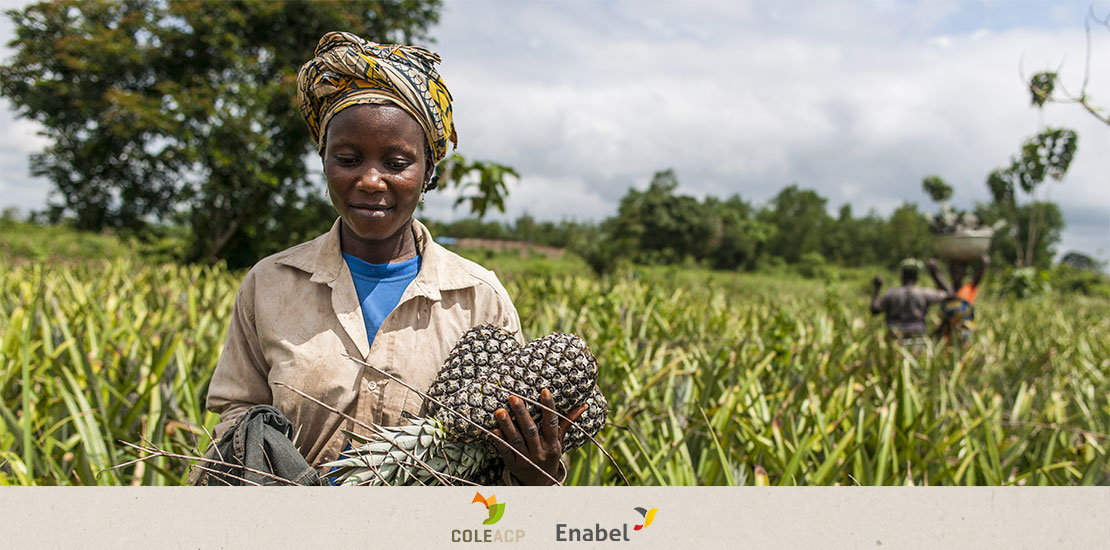 On 23 February, COLEACP organised a workshop in Cotonou to launch the project “Support to the agroecological transition of the pineapple sector in Benin”, within the framework of the DEFIA Programme (Development of Entrepreneurship in the Pineapple Sector) managed and financed by Enabel, the Belgian development agency. This 18-month project aims to enable operators in the pineapple value chain in Benin to begin a gradual transition to agroecology, while meeting the requirements of local, regional and international markets. The workshop,… +
On 23 February, COLEACP organised a workshop in Cotonou to launch the project “Support to the agroecological transition of the pineapple sector in Benin”, within the framework of the DEFIA Programme (Development of Entrepreneurship in the Pineapple Sector) managed and financed by Enabel, the Belgian development agency. This 18-month project aims to enable operators in the pineapple value chain in Benin to begin a gradual transition to agroecology, while meeting the requirements of local, regional and international markets. The workshop,… +STDF Togo: Training for DPV inspectors on implementing official controls
- 26/12/2021
- Posted by: Sandra Borma
- Category: News, Togo
 Inspectors of Togo’s Plant Protection Directorate (DPV) took part in training on implementing official controls during November 2021. This distance learning via the COLEACP e-Learning Platform, part of the Project for the Strengthening of the National Phytosanitary Control and Certification System for Fruits and Vegetables in Togo, aimed at reinforcing the capacity of 20 DPV inspectors to carry out official control activities of plants and other regulated products. The aim was to train participants to the procedures and instructions established… +
Inspectors of Togo’s Plant Protection Directorate (DPV) took part in training on implementing official controls during November 2021. This distance learning via the COLEACP e-Learning Platform, part of the Project for the Strengthening of the National Phytosanitary Control and Certification System for Fruits and Vegetables in Togo, aimed at reinforcing the capacity of 20 DPV inspectors to carry out official control activities of plants and other regulated products. The aim was to train participants to the procedures and instructions established… +ALFA: A new Africa-France link for agriculture and food
- 27/10/2021
- Posted by: Gaetan Dermien
- Category: Africa, France
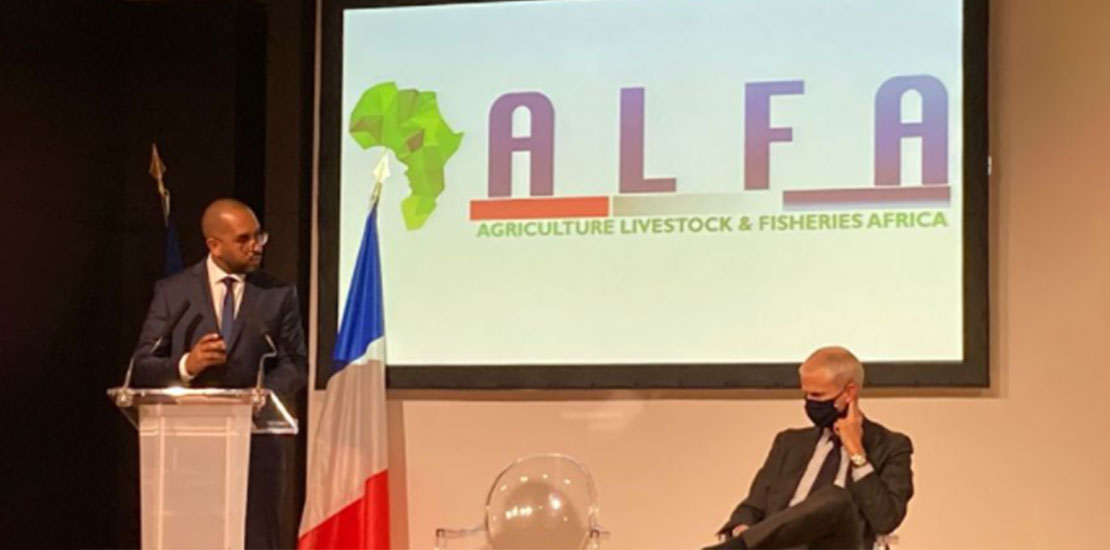 On 6 October, a new initiative was launched at the headquarters of the Movement of the Enterprises of France (MEDEF), on the sidelines of the Africa-France summit. The Agriculture-Livestock-Fisheries-Africa (ALFA) initiative, a grouping of 105 French companies covering the entire value chain, was launched by Karim Aittalb, CEO of GEOCOTON and co-founder of ALFA1, in the presence of France’s Minister for Foreign Trade, Franck Riester. The aim of this new platform is to contribute to renewing the partnership between Africa… +
On 6 October, a new initiative was launched at the headquarters of the Movement of the Enterprises of France (MEDEF), on the sidelines of the Africa-France summit. The Agriculture-Livestock-Fisheries-Africa (ALFA) initiative, a grouping of 105 French companies covering the entire value chain, was launched by Karim Aittalb, CEO of GEOCOTON and co-founder of ALFA1, in the presence of France’s Minister for Foreign Trade, Franck Riester. The aim of this new platform is to contribute to renewing the partnership between Africa… +
